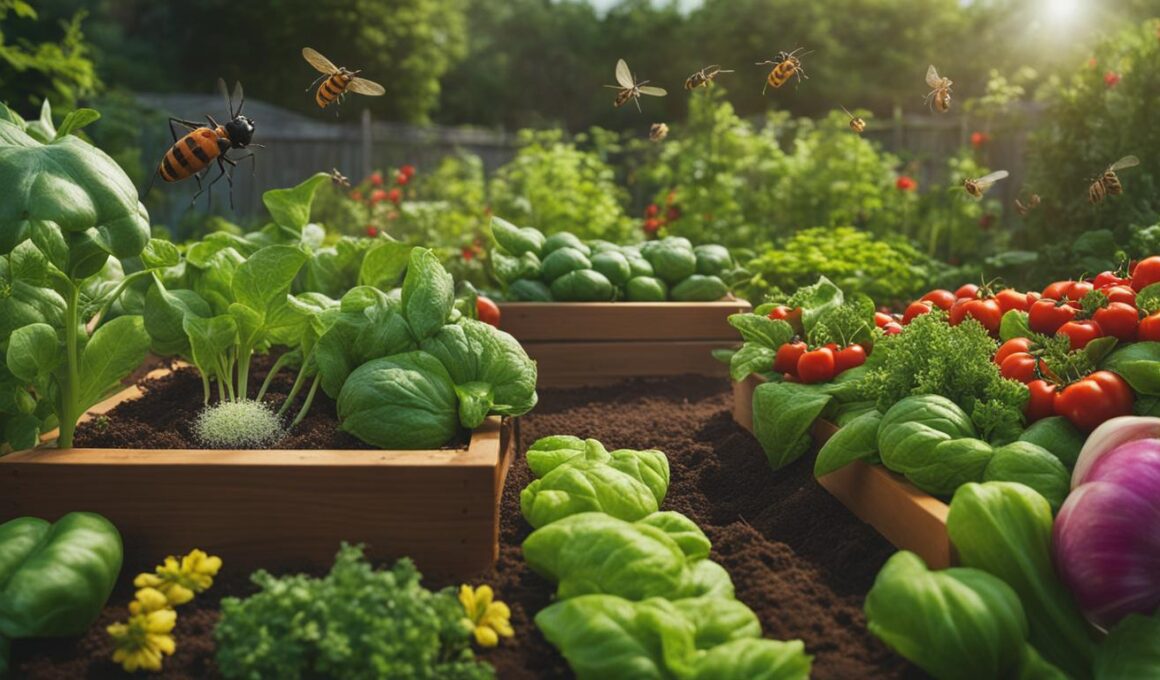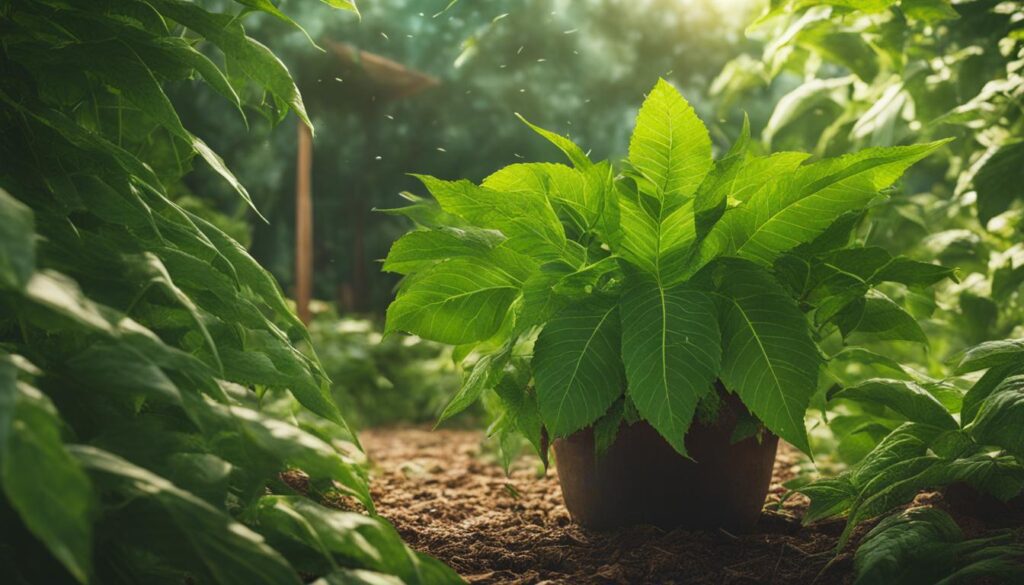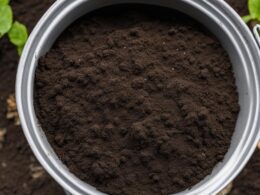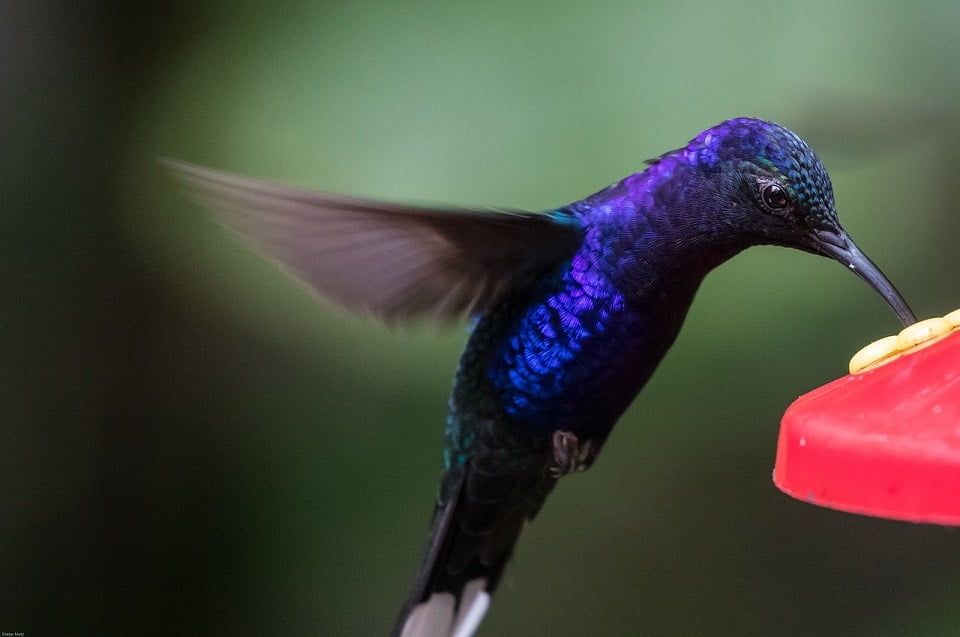Every gardener wants to protect their beloved vegetable plants without relying on synthetic chemicals. Thankfully, homemade insect repellents offer a quick and effective solution to safeguard your garden’s bounty. With natural ingredients like garlic, nettle, soap, tomato, and basil, you can target pesky pests such as aphids, mites, and thrips while promoting a harmonious, eco-conscious garden ecosystem. In this article, we’ll explore do-it-yourself pest control techniques and provide you with insights on vegetable garden care. So grab your apron and garden gloves, and let’s get started!
Key Takeaways
- Homemade bug sprays provide a safe, effective alternative to synthetic chemicals.
- Natural insecticides for plants utilize ingredients like garlic, soap, tomato, and basil for superior pest management.
- Create a balanced garden ecosystem by using eco-friendly DIY pest control techniques.
- Companion planting can attract beneficial insects, while homemade sprays target notorious garden pests.
- Always test your homemade bug spray on a small area first, applying during cooler times of the day to prevent leaf burn.
The Importance of Natural Pest Control in Your Garden
Emphasizing the value of sustainability, natural pest control aligns with gardeners’ desires for a garden that embodies ecological principles. By diversifying plant species within the garden, the likelihood of widespread pest issues is diminished. Attracting natural predators such as birds and beneficial insects can mitigate the need for artificial bug sprays.
Sustainable gardening practices encompass a holistic approach to maintaining a balanced ecosystem. In contrast to traditional pest control methods that rely on harmful chemical insecticides, eco-friendly pest management encourages biodiversity, enhances soil health, and promotes overall garden well-being. Some popular organic gardening practices include:
- Companion planting
- Soil enrichment with compost and other organic matter
- Introducing predatory insects
- Installing birdhouses or other wildlife attractions
By employing these strategies, you can reduce the reliance on synthetic bug sprays that negatively impact both the environment and the beneficial organisms living in your garden.
One example of effective natural pest control is attracting birds to your garden. Many bird species feed on common garden pests like caterpillars, beetles, aphids, and mosquitoes, decreasing their populations and thus, the damage inflicted on your plants. To attract birds, consider installing bird feeders, baths, and nesting boxes, as well as planting native plants that provide shelter and a natural food source.
In addition to birds, beneficial insects such as ladybugs, lacewings, and parasitic wasps can be integrated into your garden’s eco-system to combat pests. These predatory insects feast on garden nuisances, offering chemical-free pest control while protecting the surrounding environment from toxic pesticides.
| Beneficial Insect | Target Pests |
|---|---|
| Ladybugs | Aphids, mites, and whiteflies |
| Lacewings | Aphids, moth eggs, small caterpillars, and mealybugs |
| Parasitic Wasps | Caterpillars, beetle larvae, and flies |
Embracing eco-friendly pest management strategies helps gardeners strike a balance between protecting their plants and nurturing a healthy, sustainable garden ecosystem. By reducing the reliance on harmful chemicals and adopting organic gardening practices, you can safeguard the well-being of your garden, the local wildlife, and the environment.
Creating An Effective Insecticidal Soap Spray
Insecticidal soap serves as a powerful yet environmentally-friendly weapon in your organic pest control arsenal. By interfering with the cellular integrity of various garden pests, insecticidal soap effectively combats lacebugs, leafhoppers, and thrips without affecting birds or beneficial insects.
Understanding the Role of Soap and Oil in Pest Management
At the heart of an effective insecticidal soap spray are two key ingredients – soap and oil. The soap component primarily functions to break down the waxy protective coating found on many pests, making them more susceptible to the oil’s damaging effects. Meanwhile, the oil creates a suffocating barrier that inhibits the pests’ respiration, ultimately causing their demise.
While many DIY insecticidal soap recipes exist, it is crucial to select an appropriate soap that doesn’t harm your plants. Soaps containing degreasers or bleach should be avoided, as these ingredients can cause serious damage to your garden. Instead, opt for pure Castile liquid soap or other gentle, natural soaps for safe and effective natural aphid control and other garden pest remedies.
Mixing Your Own Insecticidal Soap: A Step-by-Step Guide
Creating a homemade soap spray is a straightforward process that requires just a few simple ingredients. Follow these steps to make your own insecticidal soap:
- Gather ingredients: Locate a vegetable oil, pure Castile liquid soap, and a spray bottle.
- Create a concentrate: Combine one cup of vegetable oil with one tablespoon of Castile liquid soap in a small container.
- Dilute the concentrate: Measure one teaspoon of the soap-oil concentrate and mix it with two cups of warm water in your spray bottle.
- Use immediately: Since the effectiveness of the solution diminishes within 24 hours, it is crucial to apply the insecticidal soap spray promptly after mixing.
To maximize the efficacy of your insecticidal soap spray, target the pests directly and ensure thorough coverage of your plants. It’s also essential to monitor your garden consistently and reapply the solution as needed. With due diligence, your pest management efforts will thrive, and your garden will achieve a healthy balance.
Unlock the Power of Neem Oil for Plant Protection
In the world of organic gardening, neem oil insecticide is a trusted and effective solution against numerous pests and diseases. Extracted from the seeds of the neem tree (Azadirachta indica), neem oil’s impressive power lies in its ability to assimilate into plant tissue, making it safe for the environment and non-target creatures like birds and pets.
Neem oil provides an effective neem oil solution to deter pests, such as aphids, whiteflies, spider mites, and several types of fungi. The unique composition of this natural insecticide allows it to act on consuming insects only and spare beneficial insects that prey on pests. It can also be applied as a root soak to address root rot and other soil-related issues.
If you’re looking to create your own DIY neem spray, follow these simple steps:
- Purchase pure, cold-pressed neem oil from a reliable supplier.
- Mix 1-2 teaspoons of neem oil with 1 quart of warm water.
- Add a few drops (about 1/3 teaspoon) of mild liquid dish soap as an emulsifier.
- Stir the solution well and pour it into a spray bottle.
- Apply the solution evenly on the affected plants, making sure to coat both the top and bottom of leaves. It is best to do this during the cooler parts of the day or in the early evening to prevent leaf burn.
Using this homemade neem oil spray can significantly enhance your garden’s natural defenses and contribute to a healthy, thriving ecosystem. However, it’s essential to monitor your plants closely and adjust the frequency and dosage of neem oil applications based on the severity of the infestation. In most cases, a weekly application is sufficient, but severe infestations may require more frequent treatments.
| Advantages of Neem Oil | Disadvantages of Neem Oil |
|---|---|
| Environmentally friendly | Has a strong odor |
| Safe for pets and beneficial insects | May cause leaf burn if applied during high temperatures |
| Effective against a wide range of pests and diseases | Needs frequent applications for severe infestations |
| Can be used as a preventative measure | Not as fast-acting as synthetic insecticides |
In conclusion, harnessing the power of neem oil insecticide can serve as an essential component in your organic gardening toolkit. This natural, non-toxic solution offers a multifaceted approach to pest management, protecting your plants from various invaders while promoting a balanced and sustainable garden ecosystem.
Vinegar Spray: A Potent Homemade Insecticide
When it comes to natural, effective, and easy-to-make solutions for garden pest control, vinegar spray stands out as a reliable homemade insecticide. Its strong acetic acid content provides it with an excellent ability to target a variety of garden pests while also repelling those driven by scent, such as ants. In this section, we will discuss how acetic acid works against pests and provide a simple recipe for creating a homemade vinegar bug spray.
How Acetic Acid Works Against Pests
Acetic acid, the primary active ingredient in vinegar, is responsible for its sour taste and strong odor. In the context of pest control, the acid affects pests in two primary ways: physical damage and repellent properties.
When vinegar comes into direct contact with pests, the acetic acid can dissolve their exoskeletons and cause dehydration, effectively killing or debilitating them. However, it is important to note that vinegar spray requires direct contact with the pests for this method to be effective. Additionally, the strong smell of vinegar can mask desirable scents for insects, deterring scent-driven pests from invading your garden.
It is worth mentioning that vinegar insecticide should be used with caution, as it can also harm beneficial insects and potentially damage plants if not diluted and used according to the instructions.
- Mix equal parts vinegar and water in a spray bottle.
- Add a few drops of dish soap to act as a surfactant, helping the solution to stick to the pests and plants.
- Shake the bottle well to mix the ingredients.
- Apply the homemade vinegar bug spray directly to pests and on the affected areas of your plants, ensuring to target the undersides of leaves where pests generally hide.
- Monitor the treated areas and reapply the solution as needed.
While acetic acid pest control is a useful tool in managing garden pests, it should be utilized in conjunction with other eco-friendly pest management strategies to protect your garden and promote a healthy ecosystem.
Garlic and Hot Pepper Sprays: Spicy Solutions for Bug Infestations
Garlic spray for plants and hot pepper insect repellent are two highly effective, natural pest control sprays that utilize bold aromas and potent compounds to repel various garden pests. By combining these spicy ingredients with water and soap, you can create powerful deterrents that help keep aphids, slugs, and carrot flies at bay. These homemade sprays, when applied consistently to your plants, can reduce your reliance on synthetic pesticides while supporting a thriving garden ecosystem.
To better understand the protective qualities of these natural repellents, it’s helpful to examine their primary active ingredients:
- Garlic: Known for its strong, pungent odor, garlic in spray form provides a natural defense against pests that find the scent and taste unappealing.
- Hot pepper: The capsaicin found in hot peppers, such as cayenne or chili peppers, is a highly effective repellent that irritates and deters a variety of insects from consuming plants.
To harness the power of these potent ingredients and help protect your garden, consider making your own garlic and hot pepper insects repellent using the following recipe:
- Blend two cloves of garlic, one small onion, and one hot pepper with water until smooth.
- Strain the mixture to remove solids and add a teaspoon of liquid dish soap.
- Fill a spray bottle with the mixture and shake well before each use.
- Apply to infested plants as needed, taking care to avoid direct sunlight and extreme heat.
Note: Always test the spray on a small area of a plant first, monitoring for any adverse reactions, and avoid applying during the heat of the day to prevent leaf burn.
In summary, garlic and hot pepper sprays offer an eco-friendly, natural alternative to synthetic pesticides. By harnessing the powerful scents and compounds of these ingredients, you can effectively protect your garden from infestations while maintaining a healthy ecosystem.
Can Homemade Bug Sprays for Vegetable Plants Harm Grass If It Accidentally Gets Sprayed on It?
Yes, homemade bug sprays for vegetable plants can harm grass if the “effect of spray paint on grass” accidentally gets sprayed on it. Some ingredients in the bug spray can be harmful to grass and may cause damage. It’s important to be cautious and avoid spraying the bug spray near the grass to prevent any potential harm.
Conclusion
Eco-friendly pest solutions, homemade garden sprays, and sustainable plant care are vital aspects of maintaining a thriving vegetable garden. By utilizing natural ingredients like soap, neem oil, vinegar, garlic, and hot pepper, gardeners can create effective and safe pest control solutions that cater to the well-being of the environment.
Embracing homemade insect repellents not only aids in promoting a balanced and pesticide-free garden ecosystem but also ensures the health of both plants and the animals that inhabit the garden. Furthermore, these DIY solutions provide an opportunity to practice organic gardening, encouraging responsible stewardship of the land.
In summary, adopting homemade bug sprays for your vegetable plants is a sensible and environmentally conscious approach to managing pest populations while prioritizing sustainable plant care. Protect your harvest, contribute to a balanced garden ecosystem, and invest in a greener future for all.











